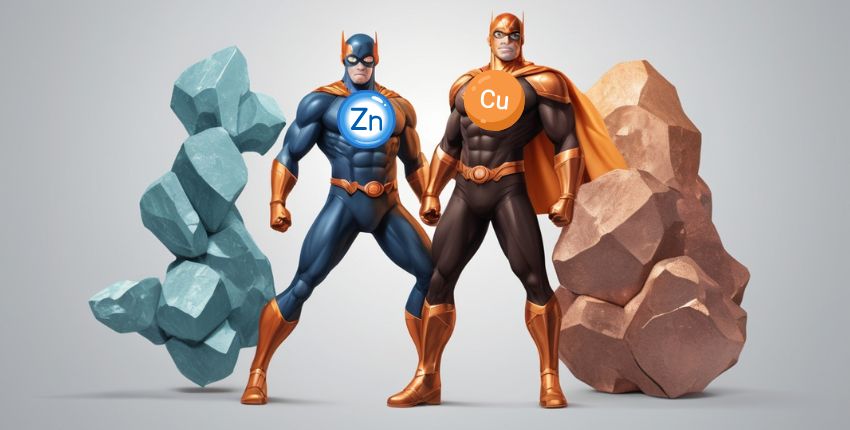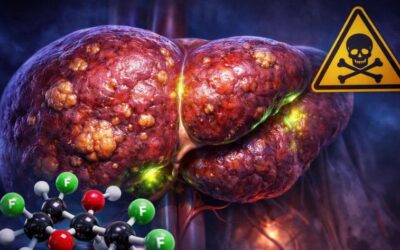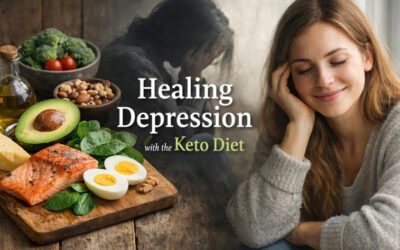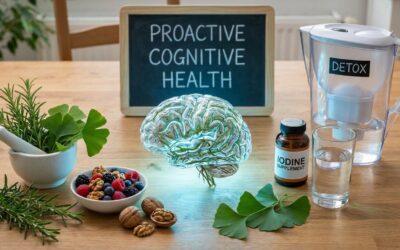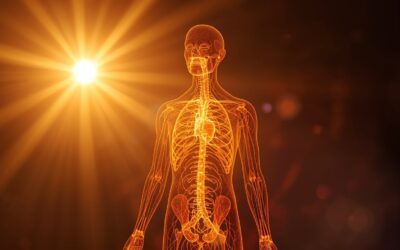In today’s world, our soils are depleted, environmental toxins interfere with nutrient absorption, and poor gut and liver health make it harder for your body to absorb the nutrients you do consume. That’s why supplementing with key trace minerals is more important than ever. While zinc often gets a lot of attention—and yes, it is essential—it may not be the mineral your body needs most right now.
Copper, unlike zinc, is not only an essential mineral but also a chemical element, classified as Cu on the periodic table. Its position on the periodic table groups it with other metals like silver and gold, which share similar properties.
It isn’t that you don’t need zinc, but zinc and copper need each other in a delicate way. Too much of one and the other suffers. Due to the high consumption of processed foods (that accelerates copper depletion from the body), and the high supplementation of zinc during the pandemic accelerating copper depletion from the body, much of the population are walking around copper deficient.
Zinc and Copper Alloys: The Perfect Balance
Zinc and copper work together in a delicate balance. Too much zinc can push copper levels down, and if copper is too high, it can suppress zinc.
Copper is historically significant as the first metal used by humans, playing a foundational role in human development and early metallurgy.
Think of them like two sides of a seesaw; both are necessary but always need to stay in balance. When supplementing with one, make sure to keep an eye on the other.
Why Zinc?
Zinc gained a lot of attention during the pandemic especially due to its major role in boosting immunity, recovering from stress, and overcoming illness. But the benefits don’t end there; zinc is essential for tissue repair, skin health, thyroid function, and even hormonal balance. Even your sense of smell and taste may suffer if you are low in zinc.
Foods High In Zinc and the Recommended Dietary Allowances
These are often more protein-rich and animal-based, though there are solid plant options too:
• Oysters – By far the most zinc-dense food
• Beef (especially chuck roast or ground)
• Pumpkin seeds
• Lamb
• Chicken (especially dark meat)
• Lentils – Decent for plant-based zinc, though less bioavailable
• Hemp seeds
• Yogurt and kefir
• Eggs – Modest source, but easy to include daily
• Crab and lobster – Excellent seafood options
Even when consuming the foods above, people tend to be zinc deficient if they are dealing with chronic stress, gut and nutrient absorption issues, or eating a mostly plant-based diet. Many plant-based foods are high in phytates, “plant poisons”, that block zinc absorption and lead to Leaky Gut, affecting all nutrient absorption. Although yogurt and dairy contain zinc, many people cannot tolerate dairy. And, with chicken and beef, the amyloids they contain, which are misfolded proteins that don’t break down and can cause gut issues, come with negative side effects that negate the zinc content.
Why You Need Copper
Too much zinc can backfire. Zinc and copper compete for absorption and with too much zinc, copper deficiency can occur.
Copper deficiency symptoms are often blamed on other conditions like iron deficiency or calcium deficiency. Signs of copper deficiency include:
- Anemia
- Bone abnormalities
- Osteoporosis
- Neuropathy
- Low numbers of white blood cells
- Low immune system
- Stunted growth
- Premature graying of hair
- Skin paleness
Although copper is typically not in the spotlight, the benefits are massive. I call it the “hidden hero” behind many functions.
Without copper the body struggles to neutralize free radicals– the unstable molecules that damage DNA and trigger chronic inflammation. When copper is low, it leads to cellular dysfunction, poor insulin sensitivity, and ultimately insulin resistance.
Copper is also responsible for the following:
Healthy pregnancy
For fetal development, copper is essential for the nervous system, cardiovascular health, and bone development. Without copper, fetal development can be delayed and compromised.
Melanin
Copper plays a direct role in melanin production which is the pigment for the color of your hair, eyes, and skin. It activates the enzyme tyrosinase which makes melanin. With zinc, copper preserves your eye color and skin tone with age.
Brain health
Copper is needed to form the neural pathways that control creativity, memory, and mood. It plays a direct role in neurotransmitter synthesis, helping your brain cells communicate effectively. With optimal copper levels, you will experience sharper thinking, faster recall, better focus, and possibly improved mood.
As copper helps the formation of the myelin sheath, the protective coating around the nerves that allows electrical signals to move efficiently, it helps prevent brain fog, memory lapses, and even cognitive decline.
Energy Production
Copper works with iron to form red blood cells and deliver oxygen to the cells. Most people believe anemia is from iron deficiency, but it is from copper deficiency. Copper is necessary to activate enzymes like ceruloplasmin and hephastin which convert iron into the form that binds to transferrin, the main protein that carries iron through the bloodstream. Without this oxidation step, iron cannot leave the intestinal cells or be delivered where it is needed; essentially, it doesn’t matter how much iron you have if there isn’t copper to take it to where it needs to go.
If there isn’t enough copper, the iron can build up in tissues like the liver, as it can’t be released into circulation. As a result hemoglobin production drops and results in anemia that is unaffected by iron supplementation.
Immune Support
Because it regulates inflammation and oxidative stress, it is part of the body’s natural immune system. Copper is necessary for the activity of enzymes involved with immunity including Superoxide dismutase, which neutralizes free radicals and protects white blood cells from oxidative damage; Lysyl oxidase which helps prevent pathogens from spreading; and Ceruloplasmin which not only regulates iron but also is an antioxidant in immune cells.
Collagen formation
Copper is a key ingredient for collagen and elastin production, the very thing needed for firm skin, flexible joints, and connective tissues. As mentioned above, copper is needed for lysyl oxidase which cross-links collagen and elastin fibers and gives connective tissue its structure, especially in the skin, tendons, and ligaments.
Skin health
Copper stimulates angiogenesis, the formation of new blood vessels, and encourages the production of fibroblasts – the cells that synthesize collagen during tissue repair. As a result, it helps with wound healing, skin elasticity, collagen regeneration, and reduced wrinkles in the skin. It also helps with the formation of elastin which gives the skin the plumpness and ability to stretch and recoil.
Thyroid health
Along with iodine, selenium, and zinc, copper helps regulate the conversion of the inactive thyroid hormone T4 into the active thyroid hormone T3. Copper supports the enzyme systems and mitochondrial activity needed to activate and transport thyroid hormones effectively. Without copper, T4 may stay inactive, never converting into T3 which is your metabolism. Furthermore, without copper, the body won’t fully respond to thyroid hormones leading to hypothyroidism symptoms like fatigue, weight gain, and cold intolerance.
Copper also plays a part in regulating the HPT Axis, the hypothalamus-pituitary-thyroid axis; copper deficiency can disrupt the signalling leading to under or over-thyroid stimulation.
If your metabolism is slow and you have unexplained fatigue or weight gain, copper deficiency may be the culprit.
Fat loss
Copper is overlooked as a fat loss and weight management mineral but its role is far-reaching. Not only does copper activate fat-burning enzymes involved in lipolysis, the process of breaking down fat, but it is also essential for enzymes like cytochrome c oxidase, which drives mitochondrial energy production. When there is better mitochondrial health, there is more fat burned as fuel.
Furthermore, copper regulates unbound iron which leads to oxidative stress and inflammation which contributes to insulin resistance and stubborn fat storage.
Cardiovascular health
Copper supports the integrity of the blood vessels, healthy cholesterol levels, and arterial flexibility. Copper deficiency has been linked to higher LDL (bad) cholesterol and lower HDL (good) cholesterol as it regulates HDL, LDL, and triglycerides.
As copper is a required cofactor for lysyl oxidase and affects collagen and elastin, the proteins that make blood vessels strong and flexible and maintain arterial elasticity. Without it, the blood vessels become stiff and prone to damage.
Copper deficiency can also result in cardiac hypertrophy, arrhythmias, and heart failure symptoms.
Foods High in Copper
Foods naturally high in copper tend to be rich, earthy, and often plant-based or organ meats:
• Beef liver – One of the highest natural sources
• Oysters – Also high in zinc, so good for balance
• Dark chocolate – Especially with high cocoa content
• Cashews
• Sesame seeds & tahini
• Sunflower seeds
• Mushrooms – Especially shiitake
• Chickpeas
• Avocados
• Whole grains – Like oats, quinoa, and buckwheat
Once again, although these foods are high in copper, the plant-based options may not assimilate in the body due to plant poisons including phytates, lectins, mold and oxalates that cause Leaky Gut; it isn’t about the nutrients you consume- it is about what your body absorbs.
Copper Supplements and Toxicity
Copper supplements are widely available in several forms, such as copper gluconate, copper sulfate, and copper amino acid chelates. While these supplements can be helpful for preventing or correcting copper deficiency, it’s important to be aware of the risks associated with excessive intake. Copper toxicity can occur when too much copper accumulates in the body, leading to symptoms like nausea, vomiting, diarrhea, and abdominal pain. In more severe cases, copper toxicity can cause liver and kidney damage, and in rare instances, can even be life-threatening.
For example, taking high doses of copper sulfate as a supplement or accidentally ingesting it can quickly lead to toxic levels of copper in the body. The tolerable upper intake level for copper is set at 10,000 mcg per day for adults, and exceeding this amount increases the risk of toxicity. It’s also important to note that copper supplements can interact with other medications, such as antibiotics and antacids, potentially reducing their effectiveness or leading to other complications. Because of these risks, it’s essential to consult with a healthcare professional before starting any copper supplement, especially if you have a history of liver or kidney disease or are taking other medications. Responsible supplementation helps prevent copper accumulation and ensures you get the benefits of this essential mineral without the dangers of excess copper.
Why Accelerated Scalar Copper®
Because the food sources are limited and they can contain anti-nutrients to block absorption of copper in addition to the soils being depleted of all minerals including copper, supplementation is essential.
Like any supplement on the market, you have to be discerning with what you choose as most are filled with toxins, fillers, preservatives and even have high mold and bacteria counts that could cause the supplement to backfire. This is where Accelerated Scalar Copper® is unmatched.
Most copper supplements only achieve 5 to 10 percent absorption; Accelerated Scalar Copper® can achieve up to 99 percent absorption. But the benefits don’t stop there.
Unlike cheap copper supplements, this copper contains nano-sized particles, skips digestion that could be ineffective, and goes straight to work at the cellular level. It is completely free from additives, preservatives, and binders– just pure, clean, liquid copper. It is safe for sensitive bodies, as it is buffered to avoid nausea or irritation that some may feel from other copper supplements.
Lastly, it is enhanced with Scalar Technology to help drive the copper into the cells and regulate the zinc and copper balance needed in the body for optimal health.
Copper Zinc Balance
As you can see, both copper and zinc are vital nutrients for optimal health; but in our modern world, most people find themselves more copper deficient than zinc deficient. It is imperative to find the balance of these key minerals for your current state of health.
Copper Deficiency and Related Disorders
Here’s something that might surprise you: copper deficiency is one of those sneaky health issues that can really throw your body for a loop. As someone who’s spent years helping people navigate the supplement world, I’ve seen firsthand how this essential mineral quietly orchestrates so many vital processes behind the scenes. When your body isn’t getting enough copper, the ripple effects can be pretty dramatic. You might find yourself dealing with stubborn anemia that just won’t budge no matter how much iron you throw at it, a immune system that’s basically waving a white flag, or connective tissue problems that leave your bones and joints feeling like they’re falling apart.
Now, here’s where it gets interesting – one of the biggest culprits behind copper deficiency is actually poor absorption. If you’re someone living with gastrointestinal conditions like celiac disease or Crohn’s disease, your digestive system is essentially putting up roadblocks that prevent minerals like copper from getting where they need to go. It’s like having a bouncer at the door who’s a little too good at their job.
Take Menkes disease, for example – this rare genetic condition is a real eye-opener when it comes to understanding just how crucial copper is for our development. Kids with this disorder often struggle with developmental delays and muscle weakness from an early age, which really drives home how fundamental copper is for proper growth. But here’s something that catches a lot of people off guard: taking too much zinc can actually create a copper deficiency. These two minerals are like competitors fighting for the same seat on the absorption bus, and when zinc gets pushy, copper gets pushed out. It’s this delicate balancing act that makes me always remind my clients to think holistically about their supplement routine – because sometimes what seems helpful can accidentally create new problems.
Interactions Between Copper and Zinc
Here’s something fascinating that I’ve seen trip up so many of my clients over the years: copper and zinc are like that dynamic duo in your body that absolutely must work in harmony. These two powerhouse minerals are both absolutely critical for your health, but here’s the kicker – they’re basically fighting for the same seat on the bus when it comes to absorption in your digestive system. When you start loading up on zinc (and trust me, I’ve seen people go overboard thinking more is always better), it literally kicks copper to the curb, blocking its absorption and creating a deficiency you never saw coming. That’s exactly why those recommended dietary allowances aren’t just random numbers – they’re your roadmap to keeping these mineral superstars in perfect balance.
Let me paint you a picture of why this balance matters so much. Take superoxide dismutase – now that’s an enzyme that’s worth its weight in gold! This cellular superhero absolutely depends on having both copper and zinc on deck to do its job protecting your cells from all that oxidative damage flying around. When your copper levels tank because you’ve been going heavy on the zinc, these protective enzymes basically throw in the towel, leaving your body struggling to fight off those nasty free radicals. This is just one perfect example of why I’m always preaching about mineral balance to my clients – it’s not just theory, it’s your body’s reality! Stick to those recommended amounts for both copper and zinc, and you’ll have these essential minerals working as the ultimate tag team, powering everything from your immune system to your daily energy levels.
Groups at Risk of Copper Deficiency
Certain groups of people are more likely to experience copper deficiency due to their unique dietary needs or health conditions. Individuals with gastrointestinal disorders such as celiac disease or Crohn’s disease often have trouble absorbing minerals, including copper, putting them at higher risk. People who follow vegan or vegetarian diets may also face challenges, as copper from plant-based sources is not as easily absorbed as copper from animal-based foods. Additionally, those who take high doses of zinc supplements—sometimes in an effort to boost immunity—may inadvertently lead themselves into copper deficiency, since zinc can interfere with copper absorption.
Pregnant and breastfeeding women represent another group with increased copper demand. During pregnancy, copper is essential for the proper development of the fetus, including the formation of the heart, blood vessels, and nervous system. For example, inadequate copper intake during pregnancy can lead to developmental issues and birth defects. Recognizing these risk factors is key to ensuring that everyone, especially those with higher needs or absorption challenges, gets enough copper to support healthy development and overall well-being.Conclusion
Copper is truly the unsung hero in our body’s mineral orchestra. From supporting energy production and brain function to maintaining healthy skin, blood vessels, and immune defenses, its role is absolutely vital. But here’s the thing — copper doesn’t work alone. It needs to be in balance, especially with zinc, to keep everything running smoothly. In today’s world, where soil depletion and dietary challenges make getting enough copper tricky, being mindful of your intake and absorption is more important than ever.
Whether you’re aiming to boost your energy, support your thyroid, or just keep your hair and skin glowing, copper deserves a spot on your wellness radar. And if you’re considering supplements, remember: quality and balance matter. Don’t let zinc steal the show and push copper out! Keep these minerals in harmony, and you’ll be giving your body the foundation it needs to thrive.
So here’s to copper — the hidden champion that’s been quietly powering humanity for thousands of years. Let’s give it the attention it deserves and keep that mineral balance strong for a healthier, happier you.
Sara Banta
Sara Banta is a Stanford University Graduate with a Degree in Economics and Psychology, and a certified Natural Supplement Expert & Graduate of the Institute for Integrative Nutrition. Sara is the Founder of Accelerated Health Products and host of the health & wellness podcast, Accelerated Health Radio.
- Sara Banta
- Sara Banta
- Sara Banta
- Sara Banta
- Sara Banta
- Sara Banta
- Sara Banta
- Sara Banta
- Sara Banta
- Sara Banta
- Sara Banta
- Sara Banta
- Sara Banta
- Sara Banta
- Sara Banta
- Sara Banta
- Sara Banta
- Sara Banta
- Sara Banta
- Sara Banta
- Sara Banta
- Sara Banta
- Sara Banta
- Sara Banta
- Sara Banta
- Sara Banta
- Sara Banta
- Sara Banta
- Sara Banta
- Sara Banta
- Sara Banta
- Sara Banta
- Sara Banta
- Sara Banta
- Sara Banta
- Sara Banta
- Sara Banta
- Sara Banta
- Sara Banta
- Sara Banta
- Sara Banta
- Sara Banta
- Sara Banta
- Sara Banta
- Sara Banta
- Sara Banta
- Sara Banta
- Sara Banta
- Sara Banta
- Sara Banta
- Sara Banta
- Sara Banta
- Sara Banta
- Sara Banta
- Sara Banta
- Sara Banta
- Sara Banta
- Sara Banta
- Sara Banta
- Sara Banta
- Sara Banta
- Sara Banta
- Sara Banta
- Sara Banta
- Sara Banta
- Sara Banta
- Sara Banta
- Sara Banta
- Sara Banta
- Sara Banta
- Sara Banta
- Sara Banta
- Sara Banta
- Sara Banta
- Sara Banta
- Sara Banta
- Sara Banta
- Sara Banta
- Sara Banta
- Sara Banta
- Sara Banta
- Sara Banta
- Sara Banta
- Sara Banta
- Sara Banta
- Sara Banta
- Sara Banta
- Sara Banta
- Sara Banta
- Sara Banta
- Sara Banta
- Sara Banta
- Sara Banta
- Sara Banta
- Sara Banta
- Sara Banta
- Sara Banta
- Sara Banta
- Sara Banta
- Sara Banta
- Sara Banta
- Sara Banta
- Sara Banta
- Sara Banta
- Sara Banta
- Sara Banta
- Sara Banta
- Sara Banta
- Sara Banta
- Sara Banta
- Sara Banta
- Sara Banta
- Sara Banta
- Sara Banta
- Sara Banta
- Sara Banta
- Sara Banta
- Sara Banta
- Sara Banta
- Sara Banta
- Sara Banta
- Sara Banta
- Sara Banta
- Sara Banta
- Sara Banta
- Sara Banta
- Sara Banta
- Sara Banta
- Sara Banta
- Sara Banta
- Sara Banta
- Sara Banta
- Sara Banta
- Sara Banta
- Sara Banta
- Sara Banta
- Sara Banta
- Sara Banta
- Sara Banta
- Sara Banta
- Sara Banta
- Sara Banta
- Sara Banta
- Sara Banta
- Sara Banta
- Sara Banta
- Sara Banta
- Sara Banta
- Sara Banta
- Sara Banta
- Sara Banta
- Sara Banta
- Sara Banta
- Sara Banta
- Sara Banta
- Sara Banta
- Sara Banta
- Sara Banta
- Sara Banta
- Sara Banta
- Sara Banta
- Sara Banta
- Sara Banta
- Sara Banta
- Sara Banta
- Sara Banta
- Sara Banta
- Sara Banta
- Sara Banta
- Sara Banta
- Sara Banta
- Sara Banta
- Sara Banta
- Sara Banta
- Sara Banta
- Sara Banta
- Sara Banta
- Sara Banta
- Sara Banta
- Sara Banta
- Sara Banta
- Sara Banta
- Sara Banta
- Sara Banta
- Sara Banta
- Sara Banta
- Sara Banta
- Sara Banta
- Sara Banta
- Sara Banta
- Sara Banta
- Sara Banta
- Sara Banta
- Sara Banta
- Sara Banta
- Sara Banta
- Sara Banta
- Sara Banta
- Sara Banta
- Sara Banta
- Sara Banta
- Sara Banta
- Sara Banta
- Sara Banta
- Sara Banta
- Sara Banta
- Sara Banta
- Sara Banta
- Sara Banta
- Sara Banta
- Sara Banta
- Sara Banta
- Sara Banta
- Sara Banta
- Sara Banta
- Sara Banta
- Sara Banta
- Sara Banta
- Sara Banta

